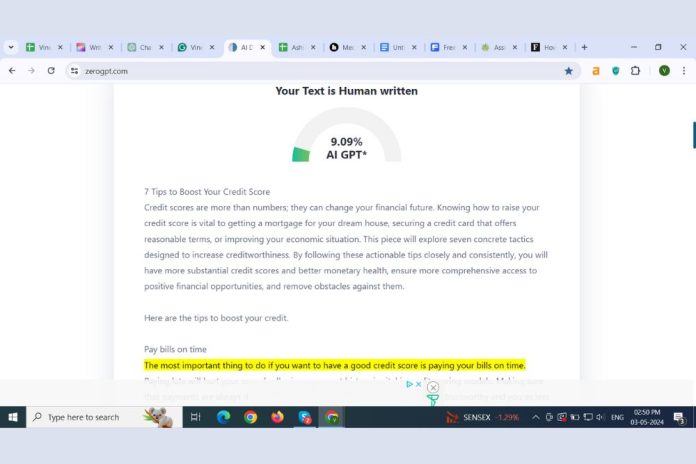Credit scores are more than numbers; they can change your financial future. Knowing how to raise your credit score is vital to getting a mortgage for your dream house, securing a credit card that offers reasonable terms, or improving your economic situation. This piece will explore seven concrete tactics designed to increase creditworthiness. By following these actionable tips closely and consistently, you will have more substantial credit scores and better monetary health, ensure more comprehensive access to positive financial opportunities, and remove obstacles against them.
Here Are The Tips To Boost Your Credit
Pay bills on time
The most important thing to do if you want to have a good credit score is paying your bills on time. Paying late will hurt your score badly since payment history is vital in credit scoring models. Making sure that payments are always done when they should be portrays the borrower as trustworthy and you as less risky. When due dates slip your mind, it might help to automate or remind yourself of them so they are not forgotten.
A debt can stick around on someone’s financial record for many years after one instance of nonpayment, which could cause their number to drop significantly below average, thus making timeliness key over long periods when it comes to maintaining or enhancing creditworthiness.
Keep credit card balances low
To achieve a good credit score, the most important thing you should do is pay your bills on time. This can damage your score as payment history usually holds a high weight in credit scoring models. They ensure that payments are made promptly when they are due, show the lender that you can be trusted, and reduce their risk to you.
Sometimes, it may help if these deadlines are automated or otherwise reminded so they do not wholly slip from memory.One missed payment could haunt someone’s financial record for many years and lower their number far below average; therefore, consistent punctuality becomes crucial in establishing or improving creditworthiness over extended periods.

Check credit report for errors
Keeping an exact record of your credit history demands you frequently review your credit report for mistakes. Incorrect personal details, accounts that are not yours, and wrong payment statuses can damage your credit score and indicate identity theft or reporting errors. The Fair Credit Reporting Act allows you to obtain one free credit report each year from the three main credit bureaus: Equifax, Experian, and TransUnion.
Please take this opportunity to scrutinize the document for any inconsistencies and resolve them as soon as possible. Regular monitoring of your credit report enables you to detect and rectify inaccuracies early; thus, your credit rating will mirror your actual financial conduct, increasing your chances of getting favorable terms on loans in times to come.
Limit new account openings
It is essential to impose a limit on the frequency of opening new accounts to have a steady credit profile. Every time you apply for new credits, your credit report receives a hard inquiry that can temporarily reduce your rating. Furthermore, if many accounts are opened within a short duration, it may indicate financial instability to money lenders and thus decrease your creditworthiness. If you are a Mushroom Gummies vendor always limit new account opening this may hinder you business supply
Instead, concentrate on prudent or indispensable applications like applying for a mortgage or car loan. Before applying for additional loans, ask yourself whether they are necessary and if you can repay them comfortably. Spreading out fresh account openings and going after only what is needed enables one to minimize negative impacts on his/her credit score while keeping a favorable financial position intact.
Use credit responsibly with increased limits
Your credit score can be boosted by raising your credit limit, but only if it is done along with the usage of it responsibly. The credit utilization ratio decreases when the amount of credit you use compared to how much is available becomes smaller; that happens when you increase your limit. Nevertheless, resist any temptation to overspend after the ceiling on borrowing goes up. Instead, continue using credit wisely: keep balances low and pay them off in full at the end of every month.
This way, you are showing creditors that higher levels of credit can be managed without stretching yourself too thin financially. Assessing your spending habits before requesting an increase in your line of credit will help ensure that you are ready for these added responsibilities, and this will maximize the benefits of your ratings on trustworthiness with money lenders.
Keep old accounts open
To aid your credit score, keeping some of your old accounts running is good because they add up to the length of your credit history and contribute positively towards your overall credit utilization ratio. Once you close down an old account, the average age of all your accounts is decreased, which may decrease the figure shown on the dashboard. A positive payment record with an older account reflects well on one’s creditworthiness.
This should be done even if they are not active, as maintaining these accounts in a favorable position shows that lenders can trust one with credits for long periods without defaulting even when not in use frequently.

Diversify credit mix
To change your credit mix, you should have different types of loans — credit cards, mortgages, and installment credits. This makes it possible for lenders to be convinced that you can deal with various debts responsibly, thus improving your borrowing reputation. It is worth having both revolving (credit cards) and fixed-term (mortgages or car loans) facilities to prove that one can manage different payment frequencies or amounts owed.
Nonetheless, individuals should not take up fresh sources of credit unless there is a need to do so, and they must also ensure proper oversight over all their accounts.
Closing Lines
Ultimately, our lives have many advantages if we take steps towards increasing our credit score. To improve your creditworthiness and enable you to get better financial opportunities, you can follow specific steps that include paying your bills on time, keeping low balances on credit cards, monitoring your credit reports frequently, avoiding opening new accounts too often, using higher limits responsibly with more care taken to ensure this is done so for different types of credits as well. The process might be long and require much effort, but it does pay off eventually – one day or another, everything will change for the better! Take charge of today’s credit health to secure tomorrow’s wealth!


